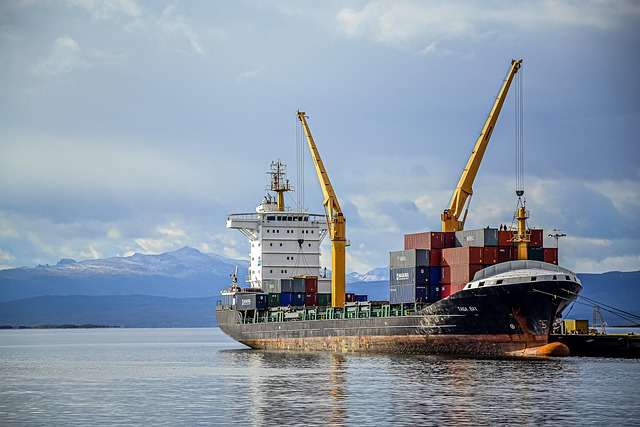Refrigerated shipping containers, featuring advanced cooling systems integrated into ISO standards, are vital for global logistics, ensuring safe and fresh transport of perishable goods like food, pharmaceuticals, and flowers. Their seamless multi-modal transport, versatile dimensions, and efficient leasing services make them indispensable in today's interconnected world, catering to increasing consumer demand for high-quality, time-sensitive products.
Refrigerated shipping containers are revolutionizing global trade by ensuring the safe transport of perishable goods at precise temperatures. As the world’s demand for fresh and high-quality products soars, these containers play a pivotal role in preserving food safety and reducing waste during transit. This article delves into the critical need for temperature control, exploring advanced cooling systems and monitoring technologies that underpin their effectiveness. We’ll also highlight the far-reaching benefits, from improved supply chain efficiency to specific industries like pharmaceuticals and fresh produce, showcasing how refrigerated shipping containers are a game-changer in modern logistics.
- The Role of Refrigerated Shipping Containers in Preserving Perishable Goods
- – Explanation of the need for precise temperature control in shipping perishable goods
- – How refrigerated shipping containers address this challenge
The Role of Refrigerated Shipping Containers in Preserving Perishable Goods

Refrigerated shipping containers play a pivotal role in the global logistics landscape, especially when it comes to preserving perishable goods. These specialized intermodal shipping containers are designed to maintain precise temperature controls, ensuring that food items, pharmaceuticals, and other sensitive cargo remain fresh and safe during transit. By integrating advanced cooling systems and insulation technologies, refrigerated containers offer a robust solution for time-sensitive shipments, reducing the risk of spoilage and waste.
In today’s interconnected world, where international trade relies heavily on efficient supply chains, refrigerated shipping containers have become indispensable. They enable seamless transportation across various modes, from sea shipping containers plying the oceans to cargo shipping containers navigating land routes. With standard ISO shipping container dimensions and capacities, these versatile storage shipping containers can be easily integrated into shipping container depots, manufacturing facilities, and even shipping container rental or leasing services. The shipping container industry trends point towards increased demand for such innovative solutions, as businesses strive to meet consumer expectations for fresh, high-quality perishable goods.
– Explanation of the need for precise temperature control in shipping perishable goods

Maintaining precise temperature control is paramount when shipping perishable goods, such as food, pharmaceuticals, and flowers, to ensure their safety and quality. These items are highly sensitive to fluctuations in temperature, which can cause spoilage, degradation, or even render them unsafe for consumption. For instance, dairy products can quickly develop unappealing textures and odors if not kept cold enough during transit, while certain medications require specific temperature ranges to remain effective.
Intermodal shipping containers, like their sea and cargo counterparts (ISO shipping containers), have become indispensable in the logistics industry, offering a robust solution for preserving perishable goods. These containers are designed with advanced temperature control systems that can maintain consistent temperatures across various environments, ensuring the integrity of the cargo during international transport. This capability is especially valuable in the shipping container industry, where efficient and reliable storage solutions, including shipping container leasing and rental services, are in high demand due to global trade’s continuous growth and diverse industry trends.
– How refrigerated shipping containers address this challenge

Refrigerated shipping containers have revolutionized the way perishable goods are transported globally. These specialized containers address the challenge of maintaining precise temperatures during intermodal shipping, ensuring that food items, pharmaceuticals, and other temperature-sensitive cargo remain safe and viable until delivery. By integrating advanced cooling systems into standard ISO shipping containers, these refrigerated units can maintain a consistent internal climate, irrespective of external weather conditions or transportation modes.
Whether for sea shipping containers, cargo shipping containers, or storage shipping containers, the use of refrigeration technology in transport has significantly expanded the reach and viability of shipping container logistics. This development has not only improved product quality but also enhanced customer satisfaction and safety standards within the shipping container industry trends. shipping container rental and leasing services have become increasingly popular, providing flexible solutions for businesses to meet their temperature-controlled transportation needs effectively and efficiently.
Refrigerated shipping containers have emerged as indispensable tools in the global logistics landscape, ensuring the safe and fresh transportation of perishable goods. By maintaining precise temperature control, these innovative solutions revolutionize the way we ship sensitive items, opening up new possibilities for international trade and catering to the ever-growing demand for efficient, reliable transportation. In a world where freshness matters, refrigerated containers are undoubtedly a game-changer.












